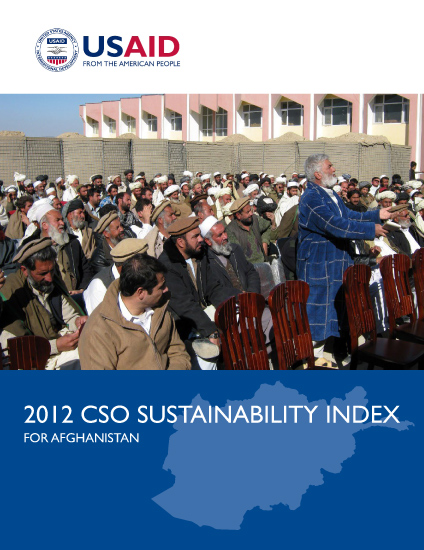- What We Do
- Agriculture and Food Security
- Democracy, Human Rights and Governance
- Democracy, Human Rights and Governance Strategy
- Supporting Free and Fair Elections
- Supporting Vibrant Civil Society & Independent Media
- Protecting Human Rights
- Promoting Accountability & Transparency
- Importance of Democracy, Human Rights, & Governance to Development
- Countering Trafficking in Persons
- Economic Growth and Trade
- Education
- Ending Extreme Poverty
- Environment and Global Climate Change
- Gender Equality and Women's Empowerment
- Global Health
- Water and Sanitation
- Working in Crises and Conflict
- U.S. Global Development Lab
BACKGROUND
The 2012 CSO Sustainability Index (CSOSI) for Afghanistan looks at the sustainability of the civil society sector based on an assessment by local civil society representatives and experts. The CSOSI is an important tool for civil society organizations (CSOs), governments, donors and academics for understanding and measuring the sustainability of the CSO sector. This publication complements other editions of the CSOSI which together cover over sixty countries and territories in Central and Eastern Europe and Eurasia, Sub-Saharan Africa, the Middle East and North Africa, and Pakistan.
APPROACH
The Index analyzes and assigns scores to seven interrelated dimensions of CSO sustainability: Legal Environment, Organizational Capacity, Financial Viability, Advocacy, Service Provision, Infrastructure, and Public Image. These scores are average to produce an overall score. Details of the methodology can be found here.
FINDINGS
An estimated 5,000 CSOs operate in Afghanistan in nearly all sectors, from basic services such as housing, education, and health, to economic development, women’s empowerment, and the environment. As of April 2012, a total of 1,707 local Non-Governmental Organizations (NGOs) were registered with the Ministry of Economy, and approximately 3,100 Social Organizations (SOs) were registered with the Ministry of Justice. Nearly two-thirds of CSOs are based in Kabul, though many CSOs have significant reach and operate in other provinces as well. Unregistered shuras (community-based councils) and jirgas (tribal assemblies of elders) are also active and important civil society actors.
According to the CSOSI, the CSO sector provides a wide range of goods and services. CSOs are increasingly involved in advocacy efforts, although the environment can be challenging for those fighting corruption and supporting women’s rights in particular. CSOs are becoming more professional and are more engaged in designing programs that address communities’ needs and priorities. The capacity of CSO varies, however, depending on size, activities, and location. At the same time, CSOs continue to face challenges related to constituency development, fund raising, strategic planning, management, staffing, and media coverage. CSOs have established a number of intermediary support organizations (ISOs) and coalitions, which help develop and consolidate the sector. Networks are becoming more common, while philanthropy that supports CSOs remains less common.
CSOs’ relations with the Afghan government have improved, although they can vary by location. The legal environment for CSOs did not change significantly in 2012, as compared to 2011, but many Afghan CSO representatives believe that
it is developing in a positive direction. The passage of several laws focused on women’s rights has generated momentum for advocacy activities. Many in the CSO sector are also concerned about the situation with regard to security and financial sustainability after 2014.








Comment
Make a general inquiry or suggest an improvement.